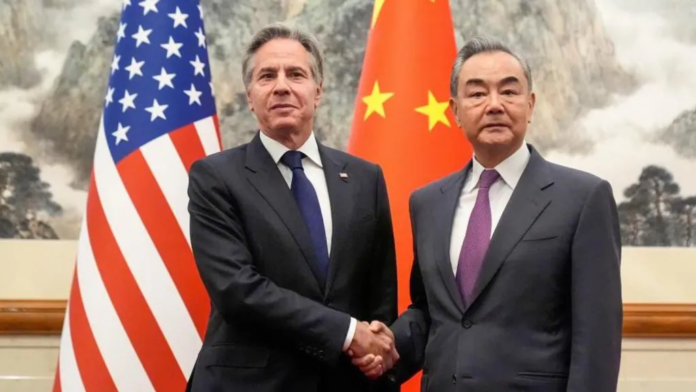Chinese Foreign Minister Wang Yi has cautioned his US counterpart Antony Blinken against stepping on China’s “red lines” at a meeting between the two countries’ top diplomats in Beijing.
Mr Wang acknowledged the China-US relationship was beginning to stabilise, but said it was still being tested by “negative factors”.
After meeting China’s President Xi Jinping, Mr Blinken stressed the need to “communicate clearly about our differences”.
This was to “minimise the risk of miscalculation and misunderstandings”.
Mr Blinken’s visit, his second to China in less than a year, forms part of a significant increase in dialogue and diplomacy – however frosty – between these rival powers as they attempt to put relations on an even keel after a period of immense tension last year.
Ties have been strained by China’s claims over Taiwan and the South China Sea, and US export bans on advanced tech. They were further damaged by a row over a spy balloon last February.
Then, just a few days ago, the US passed a law that would force Chinese-owned TikTok to sell the hugely popular video app or be banned in America.
Mr Blinken said TikTok had not come up in the talks with the Chinese leader, but a number of US concerns had.
Washington approved its latest aid package early this week which included military assistance to Taiwan. This drew sharp criticism from Beijing.
In Beijing, Mr Blinken reaffirmed US support for the “one-China policy” – a cornerstone of US-China relations under which the US recognises and has formal ties with China rather than Taiwan.
China claims self-governed Taiwan as a breakaway province that will eventually be under Beijing’s control, but the island sees itself as distinct.
At a news conference after meeting Mr Xi, the US secretary of state went on to reiterate the US’s “ironclad” support for the Philippines in their dispute over the South China Sea.
He also said he had raised concerns about the erosion of Hong Kong’s autonomy, and human rights abuses in Tibet.
Addressing China’s role further afield, Mr Blinken said he had urged the Chinese president to stop sending supplies to Russia to be used in its full-scale invasion of Ukraine and to discourage Iran and others from escalating tensions in the Middle East.
During a call earlier this month, US President Joe Biden and Mr Xi discussed avenues of co-operation, including efforts to combat climate change and narcotics.
But they clashed over the US’s support for Taiwan and trade restrictions on technology.
MORE:

